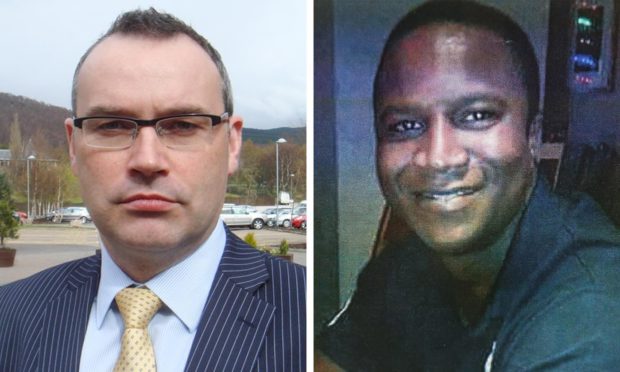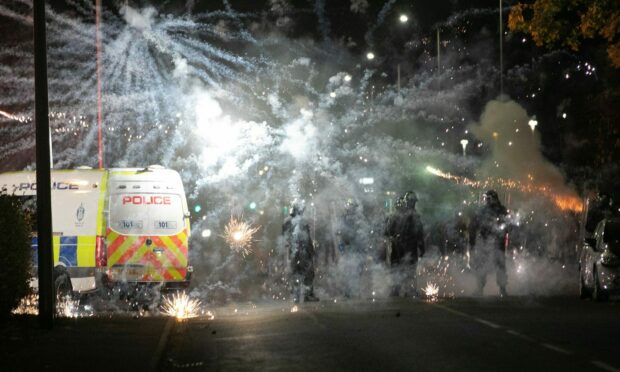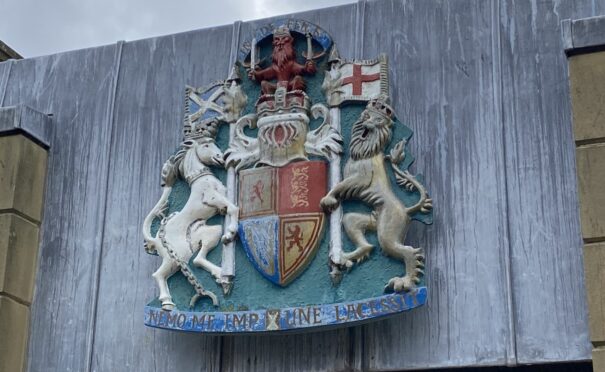The head of the Scottish Police Federation has lost a legal battle to stop disciplinary proceedings against him over an allegedly offensive tweet about the Sheku Bayoh investigation.
Calum Steele wanted a judge at the highest civil court, the Court of Session, to order Police Scotland to stop investigating him over a message he posted on Twitter.
Bosses at the force believe he may have brought it into disrepute over a message he sent over the social media network on November 11 2019.
Mr Steele, the General Secretary of the Scottish Police Federation, was commenting on a decision not to prosecute officers over their role in the death of Mr Bayoh in May 2015.
Tweet provoked fury
Mr Bayoh, from Kirkcaldy, died while in police custody. The 31-year-old father-of-two lost his life in 2015 after being restrained by police.
Mr Steele had become involved in an exchange with Aamer Anwar, the solicitor acting for Mr Bayoh’s family.
The relatives believe their loved one died because the officers who arrested him allegedly broke the law.
Mr Steele stated there was not enough evidence to prosecute his colleagues and the decision not to do so was justified.
He later posted a GIF – a short clip – from the 2004 comedy film Napoleon Dynamite showing someone being hit lightly and falling over.
There are the words of Collette Bell, partner of Sheku Bayoh, mother of their young son – on the ‘joke’ comments on Sheku’s death by Calum Steele President of the Scottish Police Federation – today following the decision not to prosecute pic.twitter.com/v8vxswqPbM
— Aamer Anwar🎗✊🏽#BlackLivesMatter (@AamerAnwar) November 11, 2019
He was accused of trivialising the circumstances surrounding Mr Bayoh’s death.
Bosses at Police Scotland believe the Tweet may have breached their guidelines on what constitutes acceptable behaviour for a police officer on social media and disciplinary proceedings started.
Breach of human rights
Mr Steele’s lawyers at the Court of Session argued his rights under article 10 of the European Convention on Human Rights – the right to freedom of expression – were being breached by the threat of disciplinary action.
However, judge Lord Fairley rejected the arguments and said the police were entitled to launch disciplinary proceedings.
In a written judgment issued at the court on Tuesday, Lord Fairley wrote the nature of police work means officers have restrictions placed on what they can say on social media.
He said that these restrictions were necessary to avoid public confidence in the force being undermined.
He added : “Whilst the views of members of the public who choose to engage in debate on social media could never be determinative of the issue, there were clearly some members of the public who regarded the use of the GIF by a police officer as inappropriate and offensive in the context of a discussion about a death in police custody.
“Quite apart from the negative comments that the Tweet received, the view of the respondent that the use of a clip from a comedy film in that context might constitute discreditable conduct was tenable and one that she was entitled to reach – at least to the standard of there being a ‘case to answer’.”
A Scottish Police Federation spokesman said: “We are considering the judgement and are unable to make any further comment at this time.”
A Police Scotland spokesperson said: “We are aware of the judgement.
“Public confidence in the police depends on police officers demonstrating the highest level of personal and professional standards of behaviour both on and off duty and includes their use of social media.
“Where inappropriate behaviour comes to our attention this will be considered by the Professional Standards Department.”










